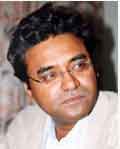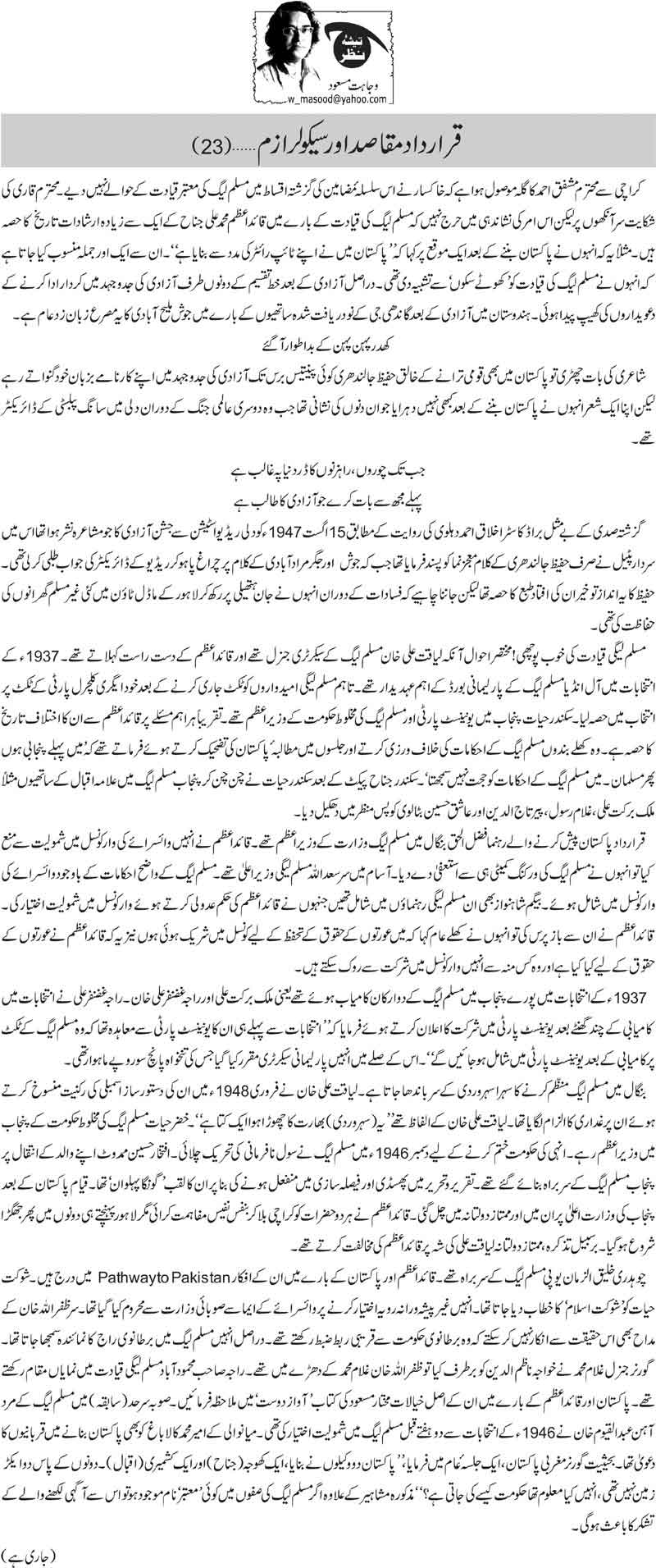
The
founder of Pakistan, Mohammad Ali Jinnah, wanted a separate country for Muslims
but his political upbringing in a pluralist society prevented him from declaring
Pakistan an Islamic state. Contrary to the general perception in India, Mr
Jinnah was arguably a secular and liberal Muslim who wanted a Pakistan where all
citizens would be equal in the eyes of the constitution irrespective of their
religion, caste or creed. But leaders like Liaqat Ali Khan and power hungry
opportunistic religious leaders wanted it to be otherwise. In this beautifully
written series titled, "Objectives Resolution and Secularism", Mr Wajahat Masood
delves deep into history to find out how Jinnah's dream of a secular and
democratic Pakistan was shattered. -- Editor
----
The Muslim League’s
leadership? Good question. Laconically speaking, Liaqat Ali khan was the
Secretary General of the Muslim League and was a right hand man of Qaide-e-Azam.
He was an important office-bearer of the All India Muslim League Parliamentary
Board in the elctions in 1937. Nevertheless, after issuing tickets to the Muslim
League candidates, he himself fought the election from the Agricultural Party.
Sikandar Hayat was the Prime Minister of the government of the Unionist Party-Muslim League alliance in Punjab. His
differences with Qaede-Azam on almost every important issue is history. He would
openly defy the insructions of the Muslim League and ridicule the demand for
Pakistan in public meetings, saying ,“ I am a Punjabi first and then a Muslim. I
do not regard the instructions of the Muslim League as binding.” --
Wajahat Masood

By Wajahat
Masood
(Translated from Urdu by Sohail
Arshad)
I have
received a letter from Mushfaque Ahmed of Karachi complaining that I have not
given credible references of the Muslim League leadership in my previous
articles of this series.
I value
the esteemed reader’s complaint but it would go without saying that many a
statement of Qaid-e-Azam Md. Ali Jinnah about the Muslim League leadership is a
part of history now. For example, after the formation of Pakistan, he once said,
“I have given birth to Pakistan with the help of a type-writer.” Another
statement attributed to him likens the Muslim League leadership to old coins. In
fact, on either side of the border after Independence a host of people emerged
claiming to have struggled for independence. Josh Malihabadi’ s famous line on newly
discovered companions of Gandhiji in India after indepence is as
follows:
Khaddar pahan pahan ke bad atwar
aagaye
Talking
of poetry, in Pakistan too, the composer of Pakistan’s national song, Hafeez
Jalandhari went on blowing his own trumpet for 35 years on his achievments
during his struggle for freedom but he never ever repeated his couplet written
during the Second World War when he was working as Director of Song Publicity in
Delhi:
Jab tak choron rahzano ka dar duniya par ghalib
hai
Pehle mujh se bat kare jo azadi
ka talib hai
According to the illustrious broadcaster of the
last century Akhlaque Ahmed Dehlvi, in the mushaira broadcast on the All India
Radio, Delhi on 15 August 1947 to mark the independence, Sardar Patel was
impressed only by the ‘wonderful’ verses of Hafeez Jalandhari while he was so
infuriated after listening to the verses of Josh and Jigar Muradabadi that he
called the station director and sought an explanation from
him.
However
Hafeez Jalandhari’s manners may be attributed to his nature but let me tell you
that during the riots, he had protected a number of non-Muslim families of Model
Town in Lahore risking his own life.
The
Muslim League’s leadership? Good question. Laconically speaking, Liaqat Ali khan
was the Secretary General of the Muslim League and was a right hand man of
Qaide-e-Azam. He was an important office-bearer of the All India Muslim League
Parliamentary Board in the elctions in 1937. Nevertheless, after issuing tickets
to the Muslim League candidates, he himself fought the election from the
Agricultural Party. Sikandar Hayat was the Prime Minister of the government of
the Unionist Party-Muslim League
alliance in Punjab. His differences with Qaede-Azam on almost every important
issue is history. He would openly defy the insructions of the Muslim League and
ridicule the demand for Pakistan in public meetings, saying ,“ I am a Punjabi
first and then a Muslim. I do not regard the instructions of the Muslim League
as binding.”
After
Sikandar-Jinnah Pact, Sikandar Hayat specifically pushed Allama Iqbal’s
companions in Punjab Muslim League
namely Malik Barkat Ali, Ghulam Rasul, Peer Tajuddin and Ashique Hussain Batalvi
to the background.
Fazlul
Haque, the leader who presented the Pakistan Resolution, was the Prime Minister
of the Muslim League government in Bengal. When Qaid-e-Azam opposed his
inclusion in the War Council of the Viceroy, he straightaway resigned from the
working commitee of the Muslim League.
Sir
Saadullah was the Muslim League Chief
Minister in Assam. Despite the Muslim League’s instructions to the contrary, he
joined the War Council of the Viceroy. Begum Shahnawaz was also among the Muslim
League leaders who joined the War Council
disobeying Qaede-Azam. When Qaede Azam demanded an explanation, she
boldly said that she joined the War Coucil to protect women’s rights and asked
what Qaid-e-Azam had done for the women’s rights and on what grounds he could
stop her from joining the War Council.
In the
elections of 1937, only two Mulsim League candidates Malik Barkat Ali and Raja
Ghazanfar Ali Khan won in the entire Punjab. Hours after his victory in the
elections, Raja Ghazanfar Ali khan announced his joining the Unionist Party
saying, “ He had a pre-election agreement with the Unionist Party that he would
join the party after winning the election on a Muslim League ticket.” In lieu of
that he was appointed the Parliamentary Secratary on a monthly salary of Rs.
500.
The
credit of organising the Muslim League in Bengal goes to Mr. Suharwardi. In
February 1948, Liaqat Ali Khan had accused him of treason and annulled his
membership of the Legistative Assembly. In Liaqat Ali Khan’s words, “ yeh(Suherwad) Bharat ka chhora hua ek Kutta
hai.” ( This man is a dog unleashed by India).
Khizir
Hayat was the Prime Minister in the coalition government of the Muslim League in
the Punjab. It was to topple his
government that the Muslim League had launched a civil-disobedience movement in
December 1946.
Iftekhar
Hussain Mumdoot was made the Head of the Punjab
Muslim League after his father’s
death. Because of his laggardness in written and spoken language and
indecisiveness, he had earned the title “ Goonga Pehlwan” ( A dumb
wrestler).
After
the establishment of Pakistan, there was a fierce rivalry between him(Ifterkhar
Hussain) and Mr Daultana for the chief ministership of the Punjab. Qaid-e-Azam
arranged a face-to-face meeting with the
two in Karachi and facilitated a patch-up between them, but once they
returned to Lahore, they started fighting again. Let me add here that Mumtaz
Daultana used to oppose Qaede Azam at the behest of Liaqat Ali Khan.
Chaudhry
Khaliquzzaman was the head of the UP Muslim League. His views on Qaed-e-Azam and
Pakistan feature in Pathway to
Pakistan. Shaukat Hayat had been conferred the title Shawakat-e-Islam. He was stripped of
state ministry on Viceroy’s instructions due to his unprofessional behaviour.
Even the admirers of Sir Zafarullah Khan will not disagree with the fact that he
had close links with the British government.
In fact, he was considered a representative of the British Raj in the
Muslim League. When Governer General Ghulam Mohammad sacked Khwaja Nazimuddin, Zafarullah Khan was on
Ghulam Mohammed’s side. Raja Sahab of Mahmoodabad had a prominent place in the
Muslim League leadership. His views on Qaid-e-Azam and Pakistan can be read in
Mukhtar Masoods book “Awaz dost”.
The Iron
man of the Muslim League in the Frontier Province(formerly) Abdul Qaiyam Khan
had joined the Muslim League two weeks before the 1946 elections. Ameer Mohammad Kala Bagh of Mianwali too
claimed to have made sacrifices for the establishment of Pakistan. Addressing a
public meeting as the Governer of West Pakistan he said, “ Pakistan was
established by two lawyers, one is a khoja( Jinnah) and the other is a Kashmiri
(Iqbal). Neither of the two had even two acers of land. How would they know how to run a
government?”
Apart
from these celebrities, if there are any other credible names in the rank and
file of the Muslim League, this writer will be grateful to
know.





 Sultan Shahin
Sultan Shahin


0 comments:
Post a Comment